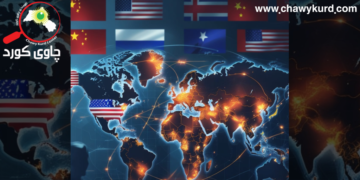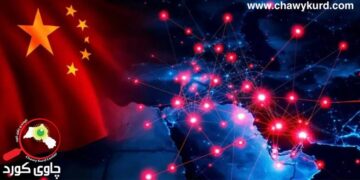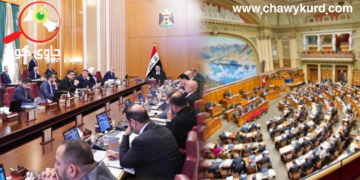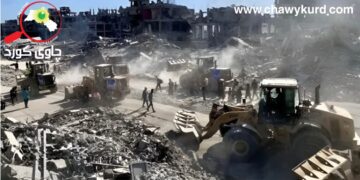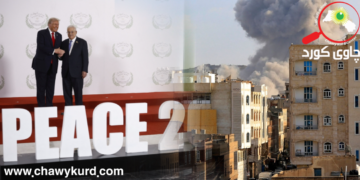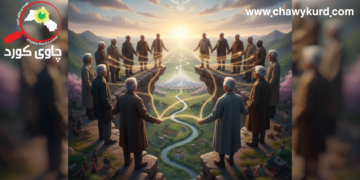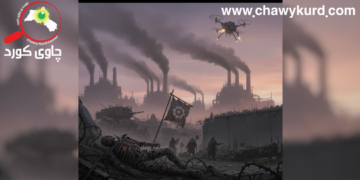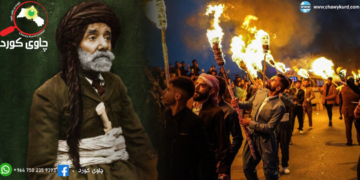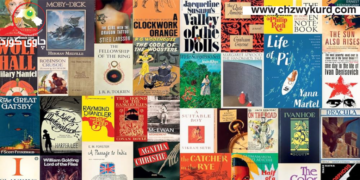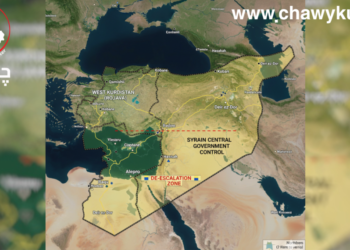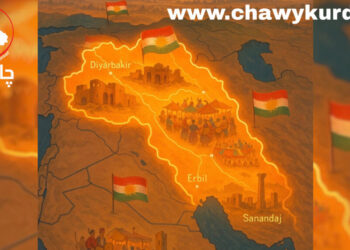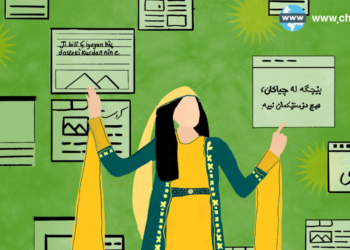One of the outcomes of the Sykes-Picot Agreement of May 16, 1916, between Britain and France was the creation of a group of states without regard for the desires and will of the nations, sub-nationalities, religions, and sects of this region. It is worth mentioning that the Sykes-Picot Agreement had spoken of a confederation of Arab states or a single Arab state. It also discussed separating the holy sites of Islam and Arabia from Turkey and placing them under an independent Islamic rule. However, these ideas were never compatible with the promises that MacMahon, on behalf of the British government, had made to Sharif Hussein. Alongside these secret dealings, Balfour, the British Foreign Secretary, had made a clandestine promise to the World Zionist Organization regarding his government’s support for the creation of a national home for the Jewish people in Palestine, an issue whose implementation became the greatest problem for the Arab peoples.
In any case, after four years, the fires of war subsided, and the Allies achieved victory. The defeated Ottoman state surrendered on October 31, 1918, according to the Armistice of Mudros. During the war years, the Arab regions of Basra, Baghdad, and a large part of the Mosul Vilayet, as well as Syria and Palestine, had been captured by Britain. After the October Revolution of 1917, Russia had withdrawn from the war and was preoccupied with its internal problems. The French had controlled the regions of southern Anatolia. The Americans, who participated alongside the Allies in the final years of the war, had no forces in the Arab regions. The 14 Points published by President Wilson of the United States had created hope for political independence among the non-Turkish peoples of the Ottoman Empire, especially Point 12, which made a direct reference to such a matter. After the Paris Peace Conference in 1919 and the San Remo Conference in 1920, the way was paved for the realization of British interests in the region, a desire that was contrary to the national aspirations of the Kurds…
“In the Regions of Southern Kurdistan”
A few days after the war began, Britain occupied the southern regions of Iraq, capturing Fao in its first assault, followed by Basra, Kut, and Amarah. At that time, Sheikh Mahmud also participated in the war against the British in the Shu’ayba area. Although the British suffered a defeat in Kut, they were able to advance after reorganizing their forces, and in March 1917, they also captured Baghdad. In Baghdad, Britain presented itself as a liberator to win the sympathy of the people. They also published a magazine called “The True Understanding” in both Persian and Arabic. This publication sought to embellish the policies of the Allies and denigrate the policies of the Ottomans and Germans.
The British advanced towards Kifri, where they established a local administration, and later their forces advanced towards Kalar and Tuz Khurmatu. They planned the occupation of Kirkuk and sent spies into the region to establish contact with Kurdish leaders. In this way, Britain secured its foothold for the occupation of Kurdistan. Then it moved towards the Kirkuk region, because Kirkuk was a commercial center and a strategic hub connecting the regions of Southern Kurdistan. After devising a military plan, they occupied Kirkuk, but they only stayed for 18 to 20 days before withdrawing. This was due to the need for British authority in the regions of Iran to fill the military vacuum created by the withdrawal of the Russians following the October Revolution, and to gain an upper hand over the Central Powers. Additionally, due to the unfavorable situation that arose from the British forces’ attack in Kirkuk, this withdrawal from Kirkuk was followed by the return of the Ottomans. However, the British later reoccupied it, thus concluding the process of occupation. As a result of this war, Kurdistan suffered immense damage, including: economic collapse, evident in the loss of vast numbers of livestock; and the killing and death of a very large number of Kurds, as Kurdistan was the battlefield. Kurdish participation was due to several factors, such as religion, because the Ottoman Sultan had issued a fatwa for jihad at the beginning of the war, and the Kurds, by virtue of being Muslims and adhering to Islam, participated. Furthermore, there was no other support for the Kurds like that of the Ottomans. The uncertainty of the war’s outcome and the weakness of Kurdish political figures led to a very high toll in material and human losses for the Kurds, as well as the deterioration of social and cultural conditions during the war years.
As one prominent writer notes, “The first shot of World War I in the Near East was fired in the eastern regions of Kurdistan.” In the post-war years, the Kurdish liberation movement was led by religious figures, sheikhs, and notables of the Sufi orders. Within this framework, Sheikh Mahmud’s revolution was the most prominent example of this post-war period. “Sheikh Mahmud, son of Sheikh Said, son of Sheikh Muhammad, son of Haji Kaka Ahmad Sheikh,” was born in 1883 in the city of Sulaymaniyah into a religious family. After the murder of his father, Sheikh Said, Sheikh Mahmud became the main authority of the family. The Sheikh was multilingual, knowing Arabic, Persian, and Turkish, and he studied at the Great Mosque in Sulaymaniyah. From the early years of World War I, under the call of “jihad,” he participated in the war with 3,000 Kurdish fighters in the battle of Shu’ayba in southern Basra against the British. However, after the defeat of the Ottomans and his return to Sulaymaniyah, he confronted the Russians. But when the Ottomans began carrying out massacres and looting Kurdish areas from behind, Sheikh Mahmud, upon his return to Sulaymaniyah, said in a meeting: “You saw what treachery the Turks committed against the Kurds. Enough is enough, I can no longer tolerate it. We must free the Kurds from subjugation and secure independence for Kurdistan.”
After the British first captured Kirkuk, the Sheikh sent two letters, one with “Muhsin Agha of Kifri” and another with “Abdullah Safi Yaqubi.” However, due to the British withdrawal from Kirkuk, these letters did not reach their destination and fell into the hands of the Ottomans. At that time, the Ottomans sent a force and arrested the Sheikh. In a special court, “Jamal Pasha of Mosul” sentenced him to death. However, this sentence was not carried out. The replacement of “Jamal Pasha” with “Ihsan Pasha” was one of the reasons. Another reason was that the situation in the southern regions of Kurdistan was chaotic, and they needed a figure like the Sheikh to manage their affairs for them. Therefore, they made him a mutasarrif (governor) and gave him 5,000 liras, and also decided to provide his forces with weapons and ammunition. However, after the British returned and re-captured Kirkuk for the second time on November 26, 1917, the Sheikh once again sent a representative, repeating his request to the British, claiming to speak of the oppression of the Ottomans and seeking to attain their rights through them. After the Armistice of Mudros, the British also captured Mosul, and the Sheikh expelled the remaining Ottoman force in Sulaymaniyah via Koya and Erbil. The British then decided to send their representative, “Major Noel,” to Sulaymaniyah. He arrived in Sulaymaniyah on October 16, 1919, to a grand reception. The Sheikh himself met him at Darikeli, and they came to Sulaymaniyah together. On November 17, 1919, in a large meeting, both Major Noel and the Sheikh gave speeches. Noel delivered a speech in Persian and granted the authority of “Hukmdar” (Ruler) to the Sheikh. At this stage, for the first time, local Kurdish affairs were organized, and he made the Kurdish language the official language of his government. But here, due to the mistakes of the Kurds and the policies of the British, this friendly relationship gradually disappeared and deteriorated. Researchers attribute the initial flexibility of British policy to several factors, including: a policy of adaptation and a shortage of forces at the beginning. Others believe it was due to the personal policy of Major Noel, who was a friend of the Kurds.
Among the most important factors that caused the deterioration of this relationship were:
-
Southern Kurdistan had been given to France in the Sykes-Picot Agreement, but Britain had kept it for itself in exchange for giving France a portion of the region’s oil. From this point on, there was no one in the region to oppose Britain except for the authority of Sheikh Mahmud, whose power they sought to diminish.
-
The replacement of Major Noel with “Major Soane.” They were two different personalities in their dealings with the Sheikh, and Soane’s policy towards the Sheikh was very poor.
-
The emergence of the Mosul Vilayet issue between Britain and Turkey created a risk of a friendly rapprochement between the Turks and Sheikh Mahmud’s authority.
-
This was in addition to Britain’s plan, to fulfill its promises to the family of “Sharif Hussein,” to make one of his sons the head of the new state it intended to establish under the name of the state of Iraq, of which this region was a part.
These factors caused the relationship between the Sheikh and the British to deteriorate. Sheikh Mahmud asked “Mahmud Khan of Dizli” to come into the city. Consequently, “Major Soane” said he must not enter the city. Soane, under the pretext of a reception, went to Basra, appointing a deputy for himself. But on May 21, the forces of Mahmud Khan of Dizli entered the city and began attacking the British forces led by Raza Beg and Jalal Irfan. Within a few hours, they controlled the city and cut the telegraph lines. Therefore, Britain sent a force under the command of “Fraser,” and a battle ensued between the two sides. British planes bombed the area, and later, in the battle of the Bazian Pass, British forces captured the Sheikh as a prisoner and sent him to Baghdad for trial. He was first sentenced to death, but later his sentence was changed to exile to India, to the “Andaman” Islands.
Thus, the first government of the Sheikh collapsed, and British forces re-entered Sulaymaniyah on June 23, 1919, and began arresting those who had assisted the Sheikh. The Sheikh’s relatives fled to Simko Shikak in Eastern Kurdistan. On August 13, “Soane” announced that Sulaymaniyah had been pacified. “Bradford” was made chief of police, and “Captain Holt” was made assistant to the military governor. “Siddiq Mazhar” was the city’s governor, and “Ghafoor Agha” was made responsible for the treasury. The British later brought a printing press to Sulaymaniyah, and on April 29, 1920, the first issue of “Peshkewtin” (Progress) was published.
During that period until the return of the immortal Sheikh Mahmud, they created the authority of the “National Council” and raised the Sheikh’s flag. Good work was done until the Sheikh’s return. Before the Sheikh was brought back, a series of changes had unsettled the situation in the region, such as the outbreak of the 1920 Revolution in Iraq. On the other hand, the discontent and turmoil that had arisen in the regions of Kurdistan against the British led them to decide to bring the Sheikh back. Sheikh Mahmud was brought back to Kurdistan and on November 19, 1922, they recognized him as the ruler of Kurdistan. In these changes, a cabinet of ministers was formed, the Kurdish language was made the official language of the state, and the flag of Kurdistan was raised. After a while, the situation began to calm down. At this time, two viewpoints emerged among the intellectuals and those around the Sheikh. One believed they should align with the British. Another view, held by the “Turkophiles,” believed they should align with the Turks. After some time, as a result of the bombing of the city of Sulaymaniyah by the British and their opposition to the Sheikh, his government was overthrown. Britain’s purpose in this action was to secure the Mosul Vilayet for itself and attach it to the state of Iraq. After a clash between the Sheikh’s forces and the British, Sheikh Mahmud evacuated the city. After a period of British withdrawal from the city, the Sheikh returned and on June 26, 1923, re-established the third cabinet with minor changes. After some time, due to certain reasons, this government also collapsed, and thus this revolution came to an end.
“British Policy Towards the Kurds”
In the years before and during the war, the British paid great attention to Kurdistan. This was mostly due to Kurdistan’s strategic location and the presence of underground minerals, especially after it became clear to them that the Kirkuk region contained a vast amount of oil. Therefore, we see “Lord Curzon” announcing regarding the southern regions: “Britain must occupy this region.” This also reveals that giving the southern regions of Kurdistan to France was tactical, not strategic. According to the Sykes-Picot Agreement, it was given to France at the beginning of World War I, but after the occupation of the southern regions of Kurdistan by Britain until the Armistice of Mudros, British policy towards the Kurdish regions was unclear and not fixed. The best evidence is that Britain had no specific program. However, after they asked “Arnold Wilson,” the British Civil Commissioner in Baghdad, to conduct a plebiscite in the southern regions of Kurdistan and then inform the British government of the results, “Arnold” conducted a plebiscite and identified a set of points that emerged from the process:
-
Do you think it is a good idea to establish a state of Iraq from the three vilayets of Basra, Baghdad, and Mosul, and for the state to be Arab?
-
If you agree with the above point, do you think an Arab should be the head of state?
-
If you agree with points “1 and 2,” who do you think should be the head?
But it is said that they did not initially reach a consensus. They also mention that the Kurds’ response was reflected in four main points:
-
Some Kurds demanded an independent entity.
-
Others demanded the creation of a Kurdish administration under British supervision.
-
Others demanded the annexation of Southern Kurdistan to the state that was expected to be formed from the three vilayets, i.e., “Iraq.”
-
A portion of them did not agree to be ruled by an Arab authority.
Here, several unclear points emerge regarding both the Kurdish side and the British side. The British had an unclear policy, and likewise, the Kurds had an unclear view on what their rights should be. Whether it should be “autonomy, federalism, or full independence” was unclear in the views of both sides. Also unclear was where in Kurdistan this right should be implemented, meaning in which region. In addition, there was no general agreement on which of the Kurds should represent the Kurds. Along with that, another of the British policies was that when the “Mandate” right was established on March 5, 1920, this region was placed under the British Mandate. According to this Mandate, British policy remained unclear, although the text of the British Mandate for Iraq stated that [no article of the British Mandate in Iraq should prevent the establishment of a Kurdish entity if Britain so desires]. Up to this point, the views among British personalities were divided into two groups. One believed that an independent Kurdish state should be created under British supervision. This group included “Lord [Curzon] and Major Noel,” and in their view, they relied on a set of arguments:
-
To increase British influence in the Caucasus, which at that time bordered the Soviet Union.
-
To put pressure on the Arabs so that they would need the British.
-
So that the British could gain the support of the Kurds against the Kemalists, who were opposing the British at that time.
-
It relates to the strategic nature of the Kurdish regions, which would give the British a freer hand to profit from this region. These views led to the Treaty of Sèvres, in articles “62, 63, and 64,” which, had it been implemented, would have been for the Kurds.
The second group of British politicians believed that Southern Kurdistan should be annexed to Arab Iraq. They included “Major Soane, Sir Percy Cox, Miss [Gertrude] Bell, and Arnold [Wilson].” To prove their views, they relied on several points, including:
-
The Turkish factor. In the Mosul Vilayet, the Kurdish issue was very important, lest the Kurds side with the Turks against the British.
-
Some believed that if this policy were implemented, this Kurdish state might side with the Soviets, changing the balance of power in the region.
-
Others saw that annexing this part of Kurdistan to the Arabs would further draw the Arabs to their side.
-
On the other hand, they would also place them over the Arab regions to oppose the Arabs and for a balance of power, because the Shia Arabs were more numerous, to create a balance with the Sunnis.
The British succeeded in those points where they wanted instability in the region for their own interests and to achieve their goals. Another point was that they believed Britain did not have a trustworthy person among the Kurds to rely on. This, in addition to the colonial interests of the British, made these views stronger for annexing Southern Kurdistan to Arab Iraq, which came to pass in the future.
“In General, British Policy Towards Kurdistan Was as Follows”
The Mosul Vilayet Issue: The historical roots of the Mosul issue go back to the days of World War I. Although some believe this issue has deeper historical dimensions and emerged four centuries ago, it was not resolved until 1925. In the early 16th century AD, the Mosul Vilayet and most of the land of Iraq and southern and eastern Anatolia were under the rule of the “Aq Qoyunlu” Turkoman state. But after the establishment of the Safavid state in 1501 AD, Shah Ismail Safavi occupied most of this region and in 1508 AD was able to capture the Mosul Vilayet as well. After the Battle of Chaldiran in 1514 AD, Sultan Selim I was able to capture Mosul and Diyarbakir and use it as a base for attacking the borders in Iraq. Although in 1623 AD the Safavids were able to recapture Mosul, it did not take long before it fell back into the hands of the Ottomans, who were later able to occupy Iraq. Although the Ottoman administrative Tanzimat law was issued in 1864 AD, this law was not implemented until the time of Midhat Pasha’s governorship of Iraq (1869-1872 AD). But he was able to implement it and divided Iraq into three vilayets: “Baghdad, Mosul, and Basra.” As for the Mosul Vilayet, its borders consisted of the vilayets of Diyarbakir and Van in the north, the Persian emirate in the east, the sanjak of “Deir al-Zor” in the west, and the Vilayet of Baghdad in the south. In 1879 AD, the structure of the Mosul Vilayet was as follows:
-
Liwa of Mosul: included these cities and towns: “Amadiya, Duhok, Sinjar, Akre, Zakho”
-
Liwa of Kirkuk: included these cities and towns: “Erbil, Rawanduz, Koya, Ranya”
-
Liwa of Sulaymaniyah: included these places: “Bazian, Shar-bajar, Jafayati Valley, Marga, Sharazur”
In this way, the Mosul Vilayet remained under Ottoman control until the era of World War I and the collapse of the Ottoman Empire. During World War I, according to the “Sykes-Picot” agreement, the Mosul Vilayet fell within the French zone. But at the end of the war, Britain believed that the articles of that treaty should be revised, through a redistribution of the area of authority with France. This was for several reasons, including: the consequences of the October Revolution, which made the Soviet Union a threat to British power and its possessions. Britain’s coveting of the oil in the region, which at that time formed the backbone of the industrial economy. Besides, Britain considered it its right to have this region, because it had captured it without any French military assistance. The British intelligence officer and expert on tribal affairs, “Leachman,” came to Mosul on November 2, 1918. When he arrived in Mosul, he demanded that the Ottoman Turkish commander, “Ali Ihsan Pasha,” evacuate Mosul, as the latter had been ordered by the high command of the British army to occupy the territory of the Mosul Vilayet. The commander of the British forces demanded that the Ottoman army immediately leave the territory of the Mosul Vilayet. In this demand, he relied on both articles “17 and 16” of the Armistice of “Mudros.” The British on “November 5, 1918,” seven days after that specified date, Colonel “Leachman” demanded that the Ottoman deputy governor leave “Mosul.” The deputy governor complied with the order on “November 13, 1918” and left Mosul, and thus Mosul was occupied.
According to the secret agreements between Britain, France, and Russia, this region had been given to France, but due to the strategic importance of the region and its oil wealth, Britain coveted the vilayet. The British seized the opportunity of the visit of “Georges Clemenceau,” the Prime Minister of France, to “London” in December “1918” to discuss the redrafting of the “Sykes-Picot Agreement.” Negotiations took place between them, and the result was Georges Clemenceau’s agreement that the Mosul Vilayet would fall within the British sphere of influence, in exchange for France receiving a share of “25%” of the Mosul Vilayet’s oil. Thus, the Mosul Vilayet fell within the British sphere of influence. The question of the future of the Kurds was a special topic in the negotiations between the Allies and the Ottoman state, from which only the Kurds of Iran were excluded. This negotiation between the Allies and the Ottoman state ended on August 10, 1920, with the signing of the Treaty of Sèvres. Its three articles “62, 63, 64” stated that within a year of the treaty’s signing, a plan for autonomous rule would be drawn up for the regions where Kurds resided and constituted a majority. These regions were identified as east of the Euphrates River, south of the Armenian border, and north of the Turkish, Syrian, and Iraqi borders. But this treaty was stillborn from the beginning because it was signed by the Ottoman Sultan. It was not long before most of the eastern Anatolian regions were lost from his control. Therefore, the Grand National Assembly of Turkey, which convened in Ankara, and the government led by Atatürk, which was designated by the same assembly, rejected the treaty and were not prepared to recognize it.
The newly formed Kemalist state believed that the Kurds of the Mosul Vilayet remaining outside Turkish authority would pave the way for the Kurds within Turkey’s borders to also raise their national cause and demand their rights. Therefore, it demanded that the Mosul Vilayet be annexed to the newly established government of Turkey. In a negotiation in 1924 with the British, they had argued that Kurds and Turks are sons of one homeland and it is impossible to separate them from their homeland. To justify this demand, they argued that Kurds have members in parliament and have nominated themselves, and that Kurds and Turks have lived side-by-side for many years without any problems. The representative of the Turkish government expressed the matter thus: “Kurds exist only in Turkey and Iran, no Kurds exist in the Mosul Vilayet, and the majority of the population of Iraq are Shia, just like the population of Iran. The population of the Mosul Vilayet is like the population of Turkey.” Therefore, he deemed it necessary that the disputed lands be given to Turkey. The representative of the Turkish government also insisted on testing the will of the population of the region and demanded a plebiscite be held in the Mosul Vilayet, so that the people could freely express their wishes. He emphasized that Kurds and Turks constitute the majority of the population of that region and are very happy to live within Turkey. Previously, Kemal Atatürk had explained to the Kurds that they should postpone their demands and issues until the land of Turkey was cleared of occupiers, meaning the forces of “Britain, Italy, Greece,” and a general peace conference was held. This could not be achieved except by the unity of Kurds and Turks. In this regard, he made a series of promises to them that the Turkish government would recognize the independence of Kurdistan, even an area larger and more extensive than that mentioned in the Treaty of Sèvres.
In this way, the Kurds were deceived by Atatürk’s words and promises and rendered the best service to the Turkish movements. When the Treaty of Lausanne was signed on “July 24, 1923,” according to that treaty, Turkey fully recovered its lands, and the name of the Kurds was not mentioned or discussed in the treaty in any way, except that it reiterated the protection and respect for the cultural and religious rights of national minorities.
“The Role of the League of Nations in the Mosul Vilayet Issue”
Resolving the Mosul issue between Britain and Turkey was difficult, so the League of Nations decided on “September 30, 1924” to resolve this issue on the ground. For this purpose, it decided to form a commission to investigate the issue. A commission was formed consisting of “Count Teleki,” a famous jurist and geographer and former Prime Minister of Hungary; “A. F. Wirsen,” the Swedish minister plenipotentiary in Bucharest, who was the chairman of the commission; and “Paulus A. Paulis,” a retired colonel of the Belgian army. The commission arrived in Mosul on “January 27, 1925” and began consulting with the inhabitants regarding their wishes for the future. The commission tried to be sure of the wishes of the inhabitants in the “Mosul” vilayet, especially the Kurds. It began to take their views separately in each liwa (district).
Liwa of Mosul: This liwa showed a greater mix of population.
The opinion of the Kurds in the Liwa of Mosul: It was a difficult task for the commission to be fully certain of the opinion of the Kurds in the “Mosul” liwa. The reasons can be summarized in the following points: The negative and intimidating role of the propaganda campaign launched by Arab nationalists and chauvinists, especially members of the “Istiqlal” party. Also, at that time, the national feeling of the Kurds of the Mosul liwa was less than in the southern regions of the vilayet. The commission reported the results of the voting as follows:
-
In some places, the majority favored Turkey.
-
In some remote places, the commission could not reach a definitive result.
-
A number of people favored Iraq.
The Yazidis generally favored Iraq, but an Iraq under a European mandate. However, some influential figures said they preferred a Turkish government to an Arab government that was not under a mandate. The Christians and Jews, however, favored attachment to Iraq, but they thought it best for it to be an Iraq under the shadow of a mandate. The commission indicated that in several areas it was not able to get the opinion of the people, especially the area that falls between the “Brussels” line and the line that the British government had drawn between Mosul and Turkey. This was due to the difficulty of the terrain and the lack of any means of transport to those areas. Also, in the Sulaymaniyah area, there were several places where there was no administration due to the movement of Sheikh Mahmud. But the town of Koya, whose population was about “60,000” people, in every way had the same opinion as the people of Sulaymaniyah. But “Rawanduz,” which was inhabited only by Kurds, the majority of them favored returning to Iraq, even though that town was the center of “Özdemir” from the end of World War I until a short time before the arrival of the commission.
“The Commission’s Report to the League of Nations and the Clauses Specific to the Kurds”
The commission submitted its report on January 16, 1925, to the League of Nations, and it contained these points that were specific to the Kurds:
-
The commission says: five out of eight parts of the population of the Mosul Vilayet are Kurds. These are neither Turks nor Arabs, because they are different from the Turks in customs, especially the matter of the place and status of women among the Kurds. Even in physical appearance, they are different from the Turks. They are closer to the Kurds of Iran, but they are not Iranians. They speak an Aryan language.
-
Arab Iraq has no extension beyond “Hit” or “Hamrin.”
In all geographical sources, from the time of the arrival of the Arabs and Islam to these regions until 1925, these disputed lands have in no way been regarded as part of the land of Iraq. Even in the past, half of Iraq was fundamentally not a common or heard name among the inhabitants of the Mosul Vilayet. Also, the city of “Kirkuk” was founded by the Kurds, and that region was the homeland of the “Gutians.” As for the pretext of Turkey, that the Mosul Vilayet is part of “Anatolia,” the commission was of the opinion that this matter is not true, because the place that separates Kurdistan and the Syrian part of Kurdistan divides them.
Proposals and Decisions of the Commission Regarding the Kurds: The commission proposed that in the case of considering the ethnic aspects, it would be best to create an independent Kurdish state. But in the case of considering the economic aspects, the commission proposed that the Mosul Vilayet be attached to Iraq, but with the following points taken into consideration:
-
Iraq should remain under the British mandate.
-
The wishes of the Kurds should be taken into account in that they should be allowed to appoint their own officials to run their country, and the Kurdish language should be official. On the other hand, the commission pointed out the fact that after “4” four years, the supervision of the League of Nations over the Iraqi-British agreement would be lifted, but the rights of the Kurds should be given. The commission also decided that from the perspective of economic analysis, the best solution is the annexation of the “Mosul” vilayet to Iraq, because it is very difficult to separate Kirkuk, Koya, and Sulaymaniyah from Baghdad. The commission also thought it best for Koya, Taqtaq, and Ranya to remain within the framework of Iraq, and Diyala likewise to belong to Iraq. Britain, which was dominant in Iraq, in a memorandum to the League of Nations had mentioned the participation of Kurds in ministries, the army, and the police. It also mentioned that the Kurds should be given their rights and the Kurdish language should be their official language.







